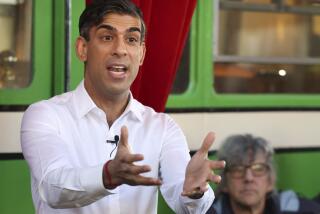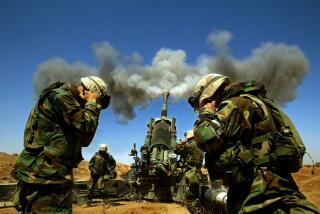Blair Overcomes Rebellion
- Share via
LONDON — The British Parliament voted to support Prime Minister Tony Blair’s hard-line policy toward Iraq on Wednesday, but only after Blair endured the worst legislative rebellion of his tenure when dissident Labor Party members endorsed an antiwar motion.
The parliamentary session displayed the growing opposition to Blair’s partnership with President Bush in any military confrontation with the Iraqi regime.
Blair averted substantive setbacks because 434 members of the 659-seat House of Commons voted for his key initiative, a cautiously worded motion that backs the United Nations in its attempt to disarm Iraq. The measure did not mention the prospect of a war involving the 42,000 British troops who have joined U.S. forces massing in the Persian Gulf.
Nonetheless, the powerful antiwar mood in Blair’s Labor Party generated a vigorous debate. The dissident Laborites introduced an amendment declaring “the case for military action against Iraq as yet unproven.”
That amendment received 199 votes, 121 of them from Blair’s disenchanted followers -- the biggest number of legislators to break ranks with a prime minister who has dominated Britain’s political arena for six years.
Labor Parliament member Chris Smith, the leader of Wednesday’s antiwar motion, called for U.N. weapons inspections to continue and scolded Blair for joining what he called a rush to war.
“The timetable appears to be determined by the decisions of the president of the United States and not by the logic of events,” Smith said. “Strength does not lie simply in military might.... It lies in making the right moral choices, in securing the fullest international agreement.”
Although most of the Conservative opposition sides with Blair, a prominent Conservative critic warned that an invasion of Iraq would provoke more terrorism rather than reduce it.
“I cannot rid myself of doubts that the course to war we are now embarked on was actually decided many months ago, primarily in Washington,” said Kenneth Clarke, a former Cabinet minister. “The next time a large bomb goes off in a Western city, how far does this policy contribute to it?”
Blair resolutely soldiered on with his campaign to persuade worried Britons that his policy has a firm moral basis. He told Parliament that Iraqi President Saddam Hussein will bear the blame for an eventual war.
“I think the case we have set out in respect of Iraq is a good case,” Blair said. “I hope that if people listen to it and study it in detail, they will accept that if we do have to act and go to war, it will not be because we want to, but because of the breaches by Saddam Hussein of U.N. resolutions.”
Blair got words of encouragement from a grandee of the Conservatives, Michael Portillo, who agreed that the “crunch point” has arrived for Hussein and the Anglo-American alliance. “Any hesitation now would be a disastrous sign of weakness,” Portillo said.
Meanwhile, Blair’s defense minister, Geoff Hoon, visited British troops in Kuwait on Wednesday and toured Bahrain and the allied military command center outside Doha, the capital of Qatar.
Hoon told reporters in Doha that only a drastic change in the Iraqi regime’s attitude toward U.N. inspections could avert a military confrontation.
U.N. Resolution 1441 “talks about full and effective cooperation, and that’s what we want to see,” Hoon said. “It’s not too late for this, but it’s getting late in the day.”
Back home in London, the pronounced divisions in the Labor Party could hurt Blair if the Iraq crisis goes disastrously wrong. Even some legislators who voted Wednesday night in favor of Blair’s initiative sounded uneasy about the future.
Gerald Kaufmann, a left-wing Laborite, said he supports a war in the long run partly because he is convinced that the Bush administration would act alone if the U.N. route failed.
“That may be a despairing argument for voting for the government’s motion tonight,” he said. “But it is a realistic argument.”
*
Stobart reported from London and Rotella from Paris.
More to Read
Sign up for Essential California
The most important California stories and recommendations in your inbox every morning.
You may occasionally receive promotional content from the Los Angeles Times.













